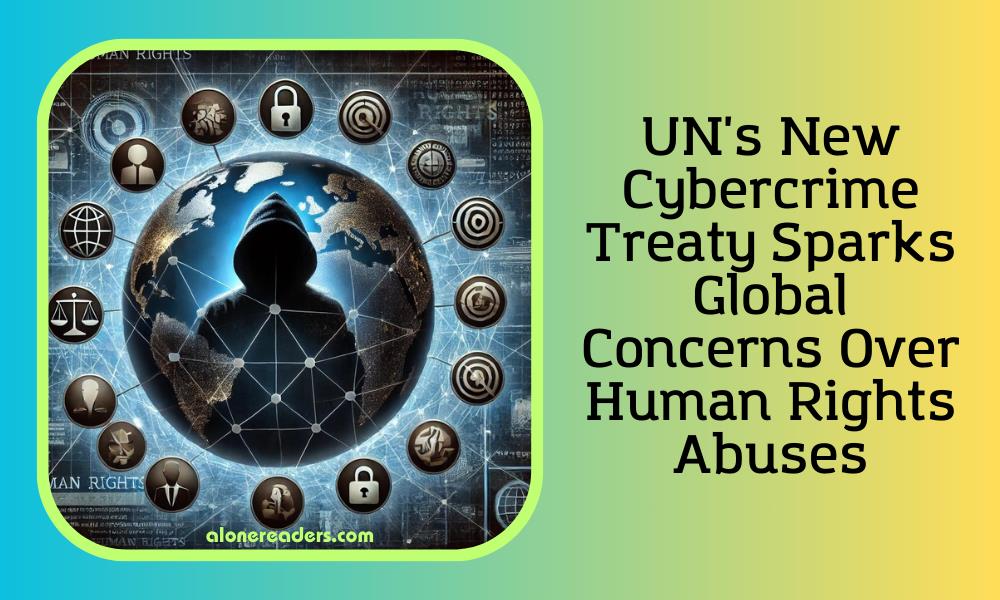
The United Nations' proposed Cybercrime Treaty has ignited a firestorm of debate and concern among human rights organizations globally. Over 100 groups have come forward to criticize the treaty, fearing that its broad provisions could empower governments to suppress dissent and infringe on individual freedoms. This emerging controversy places the UN at the center of a delicate balancing act between combating cybercrime and safeguarding fundamental human rights.
The draft of the UN Cybercrime Treaty, unveiled earlier this year, aims to establish a comprehensive international framework for combating cybercrime. The treaty addresses a wide range of issues, including hacking, identity theft, cyber fraud, child exploitation, and the misuse of digital platforms for terrorism and other criminal activities.
Proponents argue that the treaty is a necessary tool in the fight against the growing threat of cybercrime, which has become a global issue affecting individuals, businesses, and governments alike. Cybercrime costs the global economy billions of dollars annually and poses significant risks to national security. The UN's efforts to create a unified response to these challenges have been welcomed by many member states, particularly those who have struggled to combat cyber threats on their own.
However, critics argue that the treaty's broad language and lack of specific safeguards could lead to abuses by authoritarian regimes. Human rights organizations have expressed concern that the treaty could be weaponized to target activists, journalists, and political opponents, under the guise of combating cybercrime.
More than 100 human rights groups, including Amnesty International, Human Rights Watch, and the Electronic Frontier Foundation, have voiced their opposition to the current draft of the treaty. In a joint letter to the UN, these organizations highlighted several key concerns:
Vague Definitions: The treaty's definitions of cybercrime-related offenses are seen as overly broad and vague. Critics fear that such ambiguity could allow governments to interpret the treaty in ways that justify crackdowns on legitimate online activities, such as freedom of expression and access to information.
Surveillance and Privacy: The treaty includes provisions that could expand government surveillance powers, including cross-border access to data and communications. Human rights groups warn that these measures could lead to widespread privacy violations, especially in countries with weak legal protections for citizens' digital rights.
Lack of Protections for Activists and Journalists: The treaty does not include specific protections for individuals who use digital platforms to advocate for human rights, report on government abuses, or organize protests. Without such protections, activists and journalists could be at risk of prosecution under the guise of cybercrime prevention.
Increased Censorship: The treaty's provisions could be used to justify internet censorship, particularly in countries where governments already suppress dissenting voices. By labeling certain online activities as "cybercrimes," authoritarian regimes could more easily silence opposition and control the flow of information.
The controversy surrounding the UN Cybercrime Treaty highlights the ongoing global debate over digital rights and the role of governments in regulating the internet. While there is a consensus on the need to combat cybercrime, there is also growing concern about the potential for such efforts to infringe on individual freedoms.
Digital rights advocates argue that any international agreement on cybercrime must include robust safeguards to protect human rights. This includes clear definitions of what constitutes a cybercrime, strict limitations on government surveillance, and specific protections for activists, journalists, and other vulnerable groups.
On the other hand, some governments, particularly those with authoritarian tendencies, may view the treaty as an opportunity to legitimize their control over the internet. In countries where dissent is already suppressed, the treaty could provide a new tool for targeting opposition figures and curbing free speech.
The UN has acknowledged the concerns raised by human rights organizations and has expressed a willingness to engage in further dialogue. A spokesperson for the UN Office on Drugs and Crime (UNODC), which is leading the treaty negotiations, stated that the organization is committed to ensuring that the final text of the treaty respects human rights and upholds international legal standards.
However, the process of drafting and negotiating the treaty is far from straightforward. The UN must balance the diverse interests of its member states, many of whom have differing views on the role of government in regulating the internet. Some countries, particularly those in the Global North, are pushing for stronger measures to combat cybercrime, while others, especially those with more restrictive governments, may seek to use the treaty to justify censorship and surveillance.
As the negotiations continue, the future of the UN Cybercrime Treaty remains uncertain. The controversy surrounding the treaty has underscored the need for a careful and balanced approach to international cybercrime law. While the threat of cybercrime is real and must be addressed, it is equally important to ensure that the solutions do not come at the expense of fundamental human rights.
Human rights organizations have called for greater transparency in the negotiation process and for the inclusion of civil society in the discussions. They argue that the voices of those who could be most affected by the treaty—activists, journalists, and ordinary citizens—must be heard.
In the coming months, the UN will face the challenge of revising the treaty in a way that addresses the concerns of human rights advocates while still providing a robust framework for combating cybercrime. The outcome of these negotiations will have significant implications for the future of digital rights and the global fight against cybercrime.
The world is watching closely as the UN navigates this complex issue. The decisions made in the coming months could shape the future of the internet, determining whether it remains a space for free expression and innovation or becomes a tool for repression and control.
As the debate continues, one thing is clear: the stakes are high, and the outcome will have far-reaching consequences for governments, businesses, and individuals around the world.